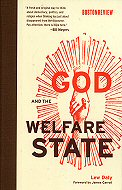|
God and the Welfare State
|
|
Lew Daly
|

|

When the Bush administration introduced the faith-based initiative in 2001 as the next stage in the war on poverty, it provoked a flurry of protest for violating the church-state divide. Most critics didn't ask whether it could work.
Setting aside partisan ideas about religion and politics, Lew Daly considers the initiative on its own terms as an anti-poverty project. A he traces it from its root in Catholic natural-law theory and 19th-century Dutch Calvinist ideas about the proper relationship between government and religion, he shows how century-old ideas were transformed into public policy by a small group of scholars, lawyers, and advocates who worked closely with George W. Bush from his earliest days as the governor of Texas.
Although Daly is deeply skeptical that Bush's initiative can be effective – it primarily helps churches, not poor people – he describes it as an innovative project and the only new strategy in fighting poverty in three decades. Most importantly, Daly suggests that a policy more faithful to the ideas behind it might actually work.
At once a remarkable story about the making of public policy and a fresh look at the possibilities for fighting poverty, God and the Welfare State gives us a new starting point in the evolving conversation about religion and American government.
Lew Daly studied Christian ethics at Union Theological Seminary in New York City, and he did pastoral work in a federal prison. Since 2002 he has worked as a research consultant for public-policy organizations.
|
|
